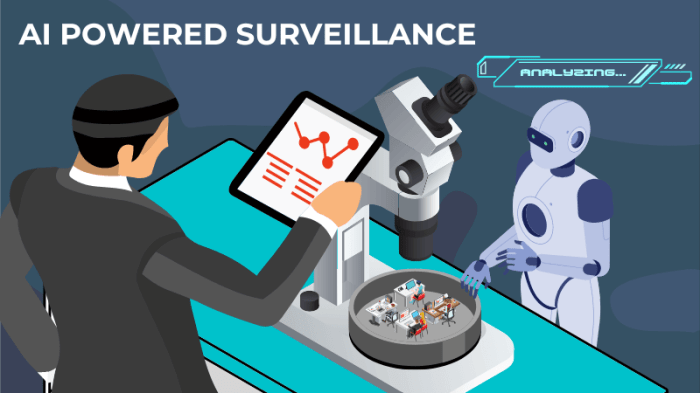Big tech user data eu surveillance is a complex and evolving issue that raises critical questions about privacy, security, and the balance of power in the digital age. As tech giants like Google, Facebook, and Amazon amass vast amounts of personal information from their users, concerns about data misuse, surveillance, and the erosion of individual autonomy have intensified.
This has prompted the European Union (EU) to implement stringent data protection regulations like the General Data Protection Regulation (GDPR) to safeguard the privacy of its citizens.
The GDPR, which came into effect in 2018, establishes a framework for regulating how companies collect, process, and store personal data. It grants individuals greater control over their data and imposes significant obligations on organizations to ensure data security and transparency.
However, the effectiveness of these regulations in the face of evolving data collection practices and the growing influence of tech giants remains a subject of ongoing debate.
Big Tech Data Collection Practices

In today’s digital world, major tech companies like Google, Facebook, and Amazon play a significant role in our lives. They provide us with essential services, such as search engines, social media platforms, and online shopping, but their operations often involve extensive data collection.
This raises concerns about privacy and the potential misuse of our personal information.
Data Collection Methods
Big tech companies employ various methods to collect user data. These methods can be broadly categorized into direct and indirect data collection.
Direct Data Collection
This involves users actively providing information to the tech companies.
- Account Creation:When creating an account on platforms like Facebook or Google, users provide personal information, such as their name, email address, and date of birth.
- Forms and Surveys:Tech companies often use forms and surveys to gather specific data about their users’ interests, preferences, and demographics.
- Purchases and Transactions:Companies like Amazon collect data about users’ purchases, including product preferences, order history, and payment information.
Indirect Data Collection
This involves collecting data without explicit user consent, often through automated means.
- Cookies and Tracking Pixels:These small files are placed on users’ devices to track their browsing activity and website interactions. This data can be used to target advertising and personalize content.
- Location Data:Smartphones and other devices collect location data through GPS and Wi-Fi signals. This information can be used to provide location-based services and target advertising.
- Social Media Activity:Platforms like Facebook and Twitter collect data about users’ posts, likes, comments, and interactions with other users. This information is used to understand user behavior and personalize content.
Types of Data Collected
Big tech companies collect a wide range of data about their users, including:
Personal Information
This includes data that can be used to identify an individual, such as:
- Name
- Email address
- Phone number
- Date of birth
- Address
Browsing History
This includes data about websites visited, search queries, and content viewed.
- Websites visited
- Search terms used
- Content viewed on social media platforms
Location Data
This includes data about a user’s physical location, such as:
- GPS coordinates
- Wi-Fi network access points
- Cell tower locations
Online Activity
This includes data about user interactions with websites and apps, such as:
- Clicks on ads
- Purchases made
- Social media interactions
EU Data Protection Regulations: Big Tech User Data Eu Surveillance

The European Union (EU) has established itself as a global leader in data protection with the implementation of the General Data Protection Regulation (GDPR). This comprehensive legislation aims to protect the personal data of individuals within the EU and has far-reaching implications for businesses, particularly big tech companies, operating within or collecting data from EU citizens.
GDPR Overview and Implications for Big Tech
The GDPR, which came into effect in May 2018, has fundamentally changed the landscape of data privacy. It applies to any organization, regardless of its location, that processes personal data of EU residents. This broad scope encompasses big tech companies that collect vast amounts of data from users across the globe.
The GDPR’s core objective is to empower individuals with greater control over their personal data. This is achieved through a combination of data protection principles, rights granted to individuals, and robust enforcement mechanisms. The regulation imposes significant obligations on big tech companies, including the need to obtain explicit consent for data processing, implement stringent security measures, and provide transparent information about data collection and use.
Key Principles of GDPR
The GDPR is built upon a set of fundamental principles that guide the lawful processing of personal data. These principles serve as the foundation for data protection and ensure that individuals’ rights are respected.
- Lawfulness, fairness, and transparency:Data processing must have a legal basis and be carried out in a fair and transparent manner. Individuals should be informed about the purposes for which their data is collected and processed.
- Purpose limitation:Personal data should only be collected for specific, explicit, and legitimate purposes. Data cannot be used for purposes other than those for which it was originally collected without obtaining further consent.
- Data minimization:Only the necessary data should be collected and processed. This principle emphasizes the importance of limiting the scope of data collection to what is truly required for the stated purpose.
- Accuracy:Personal data should be accurate and kept up-to-date. Organizations have a responsibility to ensure that the data they hold is accurate and to take steps to rectify any inaccuracies.
- Storage limitation:Personal data should be stored only for as long as necessary to fulfill the purpose for which it was collected. Organizations must have clear retention policies and delete data that is no longer needed.
- Integrity and confidentiality:Personal data should be protected from unauthorized access, use, disclosure, alteration, or destruction. Organizations must implement appropriate technical and organizational security measures to safeguard data.
- Accountability:Organizations are responsible for demonstrating compliance with the GDPR. They must be able to document their data processing activities and demonstrate that they have taken appropriate measures to comply with the regulation.
Rights Granted to EU Citizens under GDPR
The GDPR grants individuals several rights that empower them to control their personal data. These rights allow individuals to access, rectify, erase, restrict, and object to the processing of their data.
- Right to access:Individuals have the right to request access to their personal data held by an organization. This right allows individuals to confirm whether their data is being processed and to obtain a copy of their data.
- Right to rectification:Individuals have the right to request the rectification of inaccurate or incomplete personal data. Organizations are obligated to correct any inaccuracies in a timely manner.
- Right to erasure (“right to be forgotten”):Individuals have the right to request the erasure of their personal data under certain circumstances. This right applies when the data is no longer necessary for the original purpose, consent is withdrawn, or the processing is unlawful.
- Right to restriction of processing:Individuals have the right to request the restriction of processing of their data in certain situations, such as when the accuracy of the data is contested or when the processing is unlawful.
- Right to data portability:Individuals have the right to receive their personal data in a portable format, allowing them to transfer it to another organization.
- Right to object:Individuals have the right to object to the processing of their data for direct marketing purposes or based on legitimate interests.
Surveillance and Data Privacy Concerns
The vast amounts of data collected by big tech companies raise serious concerns about privacy, security, and the potential for misuse. This data can be used to create detailed profiles of individuals, which can be exploited for various purposes, including targeted advertising, manipulation, and even discrimination.
Privacy Violations
The collection and analysis of user data can lead to significant privacy violations. Big tech companies often collect personal information without explicit consent, and this data can be used to track users’ online activities, preferences, and even their physical locations.
For example, Facebook has been criticized for collecting data on its users’ friends and family, even if those individuals are not Facebook users themselves.
Identity Theft
Data breaches are a significant risk associated with big tech data collection. When personal information falls into the wrong hands, it can be used for identity theft, leading to financial losses, reputational damage, and other serious consequences. The 2017 Equifax data breach, which affected over 147 million people, highlighted the vulnerability of personal data stored by large corporations.
Discrimination
The use of algorithms and data analytics can perpetuate existing biases and lead to discriminatory outcomes. For instance, facial recognition technology has been shown to be less accurate for people of color, which can lead to wrongful arrests and other forms of discrimination.
Obtain recommendations related to tiny flying robot could work as artificial pollinator that can assist you today.
Government Surveillance
Governments increasingly rely on big tech companies to access user data for surveillance purposes. This can be done through legal means, such as court orders, or through partnerships with private companies. While government surveillance can be used to combat terrorism and crime, it also raises concerns about the erosion of individual privacy and the potential for abuse.
The Snowden revelations, which exposed the extent of government surveillance programs, highlighted the need for greater transparency and accountability in this area.
Data Breaches and Privacy Scandals
Big tech companies have been involved in numerous data breaches and privacy scandals. These incidents have damaged public trust in these companies and raised concerns about their ability to protect user data.
- In 2018, Facebook was fined $5 billion by the Federal Trade Commission for its role in the Cambridge Analytica scandal, where user data was improperly shared with a political consulting firm.
- Google has been criticized for its data collection practices, which include tracking users’ online activities even when they are not logged into their accounts.
- Amazon has faced scrutiny for its use of facial recognition technology, which has been accused of perpetuating racial bias.
Government Regulation and Enforcement
The EU has implemented a robust regulatory framework to protect user data and privacy, with the General Data Protection Regulation (GDPR) being a cornerstone. While these regulations have made significant strides, their effectiveness in safeguarding user data from the ever-evolving practices of Big Tech companies is constantly being scrutinized.
Effectiveness of Current EU Regulations
The GDPR, with its principles of lawfulness, fairness, and transparency, has empowered individuals with greater control over their personal data. It has also introduced stricter requirements for data processing, requiring companies to obtain explicit consent, demonstrate a legal basis for data processing, and implement robust data security measures.
However, the effectiveness of these regulations in practice is a subject of ongoing debate.
- Enforcement Challenges:Despite the GDPR’s comprehensive provisions, enforcement remains a challenge. The European Data Protection Board (EDPB) and national data protection authorities (DPAs) are responsible for enforcing the GDPR, but their resources are often limited, making it difficult to effectively monitor and sanction companies for violations.
- Complexity and Ambiguity:The GDPR’s complex provisions and the evolving nature of data processing technologies create ambiguity in interpretation and application. This can lead to inconsistencies in enforcement across different DPAs and make it difficult for companies to fully comply with the regulations.
- Cross-border Data Transfers:The GDPR’s provisions on cross-border data transfers, particularly the “adequacy decisions” for data transfers to countries outside the EU, have been subject to scrutiny. The Schrems II ruling highlighted the challenges of ensuring adequate protection for personal data transferred to the United States, leading to further discussions and revisions of the data transfer framework.
User Awareness and Empowerment

In the digital age, where our online activities leave a trail of data, it’s crucial to be aware of how our information is collected, used, and protected. This section will explore practical tips and strategies to safeguard your privacy online and empower you to take control of your digital footprint.
The Importance of Digital Literacy and Critical Thinking, Big tech user data eu surveillance
Digital literacy is paramount in navigating the complexities of online privacy. It equips individuals with the knowledge and skills to understand how data is collected, analyzed, and used by various entities. Critical thinking allows users to evaluate information, question data collection practices, and make informed decisions about their online privacy.
- Be aware of data collection practices:Understand how websites and apps gather information about you, such as your browsing history, location, and personal preferences. Many websites have detailed privacy policies that Artikel their data collection practices. Take the time to read and understand these policies.
- Use strong passwords and multi-factor authentication:Secure your accounts with strong, unique passwords and enable multi-factor authentication whenever possible. This adds an extra layer of security and makes it harder for unauthorized individuals to access your accounts.
- Be cautious about sharing personal information:Avoid sharing sensitive information, such as your social security number or financial details, unless absolutely necessary. Be wary of phishing attempts and scams that try to trick you into divulging personal information.
- Consider using privacy-enhancing technologies:Tools like VPNs (Virtual Private Networks), ad blockers, and privacy-focused browsers can help protect your privacy online. These technologies can encrypt your internet traffic, block trackers, and limit the amount of data that websites can collect about you.
Data Privacy Settings and Recommendations
Here is a table showcasing common data privacy settings and recommendations for users across different platforms:





